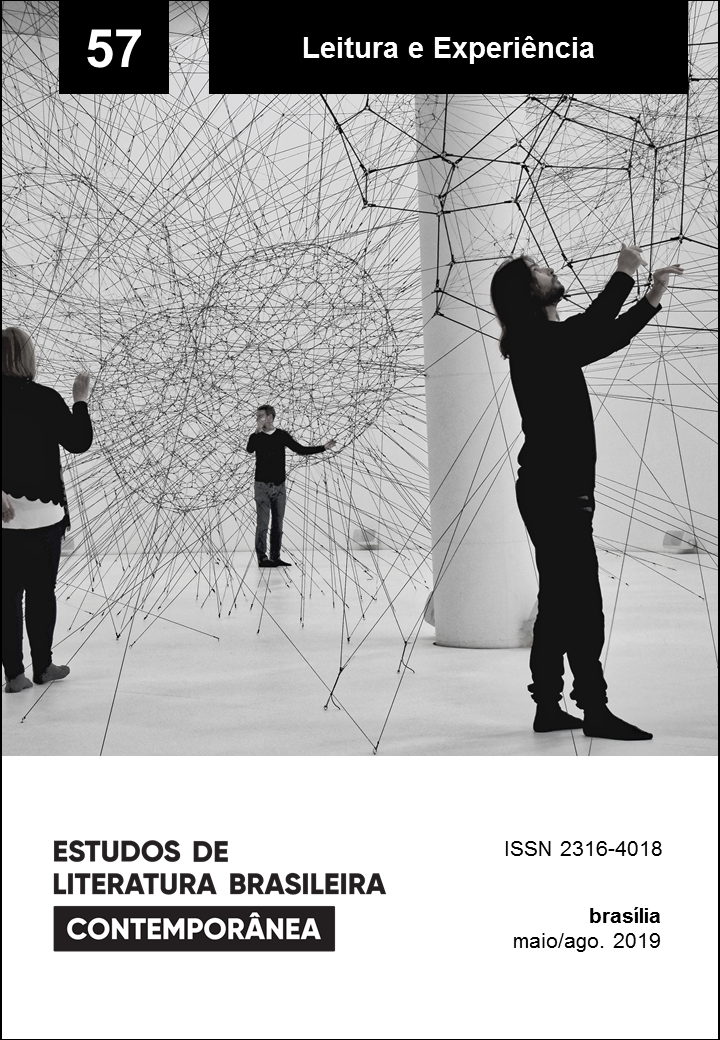Alterocupar-se: obliquation and transitionality in literary experience
DOI:
https://doi.org/10.1590/2316-4018573Keywords:
obliquation, transitionality, literary experienceAbstract
This article aims at developing the notion of obliquation, as well as understanding why literary experience seems to be its place of privilege, by means of a double, albeit conjoined, movement. First, it is a matter of thinking of obliquation, through a transversal reading of the theory of enunciation, as a fundamental condition of reflexivity. Therefore, if in his course on The Hermeneutics of the Subject, Foucault proposes an “analytics of the forms of reflexivity, inasmuch as it is the forms of reflexivity that constitute the subject as such,” in our opinion, such an exercise still needs to be complemented by an ontology of the modes of obliquation, including the literary experience analyzed here. Second, elevating the oblique to a paroxysm, we will try to argue, making free use of the concept of transitional objects, that obliquity precedes and even enables the occupation of one’s own place, i.e., that there is an ontological privilege of fiction, of othering, over one’s own subjectivity.
References
BARTHES, Roland (2004). O rumor da língua. São Paulo: Martins Fontes.
BATESON, Gregory (2000). Steps to an ecology of mind. Chicago: The University of Chicago Press.
BENVENISTE, Émile (1995). Problemas de linguística geral I. Campinas: Pontes.
BENVENISTE, Émile (2006). Problemas de linguística geral II. Campinas: Pontes.
BENVENISTE, Émile (2014). A língua e a escrita: Aula 8 (3 de fevereiro de 1969). In: BENVENISTE, Émile. Últimas aulas no Collège de France (1968 e 1969). São Paulo: UNESP. p. 127-133.
CASTRO, Amilcar de et al. (1959). “Manifesto neoconcreto”. Jornal do Brasil, Suplemento Dominical, 21-22 mar.
CATREN, Gabriel (2017). Pleromática o las mareaciones de Elsinor. Buenos Aires: Hekht Libros.
CELAN, Paul (1999). Cristal. São Paulo: Iluminuras.
COETZEE, J. M. (2004). Elizabeth Costello: oito palestras. São Paulo: Companhia das Letras.
DELEUZE, Gilles (1997). Crítica e clínica. Rio de Janeiro: Editora 34.
DERRIDA, Jacques (2014). Essa estranha instituição chamada literatura. Belo Horizonte: Editora UFMG.
DIMOCK, Wai Chee (1997). A theory of resonance. PMLA, v. 112, n. 5, p. 1060-1071.
ESPOSITO, Roberto (2007). Terza persona. Turim: Einaudi.
FAUSTO, Juliana (2017). A cosmopolítica dos animais. Tese (Doutorado em Filosofia) ”“ Pontifícia Universidade Católica, Rio de Janeiro.
FELMAN, Shoshana (2003). The scandal of speaking bodies. Stanford: Stanford University Press.
FOUCAULT, Michel (2010). A hermenêutica do sujeito: curso dado no Collège de France (1981-1982). São Paulo: WMF Martins Fontes.
HAMBURGER, Käte (2013). A lógica da criação literária. São Paulo: Perspectiva.
HUIZINGA, Johan (2001). Homo ludens: o jogo como elemento da cultura. São Paulo: Perspectiva.
ISER, Wolfgang (1996). O fictício e o imaginário: perspectivas de uma antropologia literária. Rio de Janeiro: EdUERJ.
ISER, Wolfgang (1999). O ato da leitura: uma teoria do efeito estético. São Paulo: Editora 34. v. 2.
KULISKY, Yuri (2017). O Sprachgitter de Paul Celan: uma tradução. Monografia (Graduação em Letras/Alemão) ”“ Universidade Federal do Paraná, Curitiba.
KUNDERA, Milan (2009). A arte do romance. São Paulo: Companhia das Letras.
LÉVI-STRAUSS, Claude (2003). Introdução à obra de Marcel Mauss. In: MAUSS, Marcel. Sociologia e antropologia. São Paulo: Cosac Naify.
LIMA, Luiz Costa (1980). Mímesis e modernidade. Rio de Janeiro: Graal.
LISPECTOR, Clarice (1998). Água viva. Rio de Janeiro: Rocco.
LISPECTOR, Clarice (1997). A paixão segundo G.H.: edição crítica. Madrid: ALLCA XX.
LISPECTOR, Clarice (1999). A descoberta do mundo. Rio de Janeiro: Rocco.
PESSOA, Fernando (1935/2008). Carta a Adolfo Casais Monteiro, 13 jan. Arquivo Pessoa. Lisboa. In: PESSOA, Fernando (1986). Escritos íntimos, cartas e páginas autobiográficas. Introdução, organização e notas de António Quadros. Lisboa: Publ. Europa-América. Disponível em: http://arquivopessoa.net/textos/3007. Acesso em: 22 jun. 2018.
RUDNYTSKY, Peter (Org.) (1993). Transitional objects & potential spaces: literary uses of D. W. Winnicott. Columbia: Columbia University Press.
SIMÕES, Hugo (2018). A tradução do que se cala: Paul Celan entre genocídios. Dissertação (Mestrado em Letras) ”“ Universidade Federal do Paraná, Curitiba.
TARDE, Gabriel (2007). Monadologia e sociologia e outros ensaios. São Paulo: Cosac Naify.
THOMAS, Yan (2014). Il valore delle cose. Roma: Quodlibet.
WINNICOTT, Donald Woods (1975). O brincar e a realidade. Rio de Janeiro: Imago.
Downloads
Published
Issue
Section
License
Authors who publish in this journal agree to the following terms:
a) The authors maintain the copyright and grant the journal the right of first publication, the work being simultaneously licensed under the Creative Commons Attribution License-Non Commercial 4.0 which allows the sharing of the work with acknowledgment of the authorship of the work and publication this journal.
b) Authors are authorized to enter into additional contracts separately, for non-exclusive distribution of the version of the work published in this journal (eg publish in institutional repository or as a book chapter), with authorship recognition and publication in this journal.
c) Authors are allowed and encouraged to publish and distribute their work online (eg in institutional repositories or on their personal page) after the editorial process, as this can generate productive changes, as well as increase the impact and citation of published work (See The Effect of Free Access).
d) The authors of the approved works authorize the magazine to, after publication, transfer its content for reproduction in content crawlers, virtual libraries and the like.
e) The authors assume that the texts submitted to the publication are of their original creation, being fully responsible for their content in the event of possible opposition by third parties.


